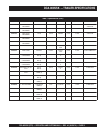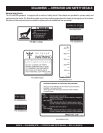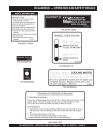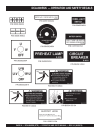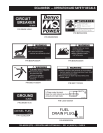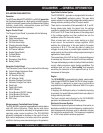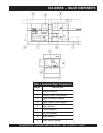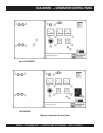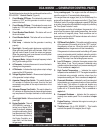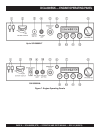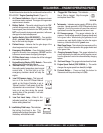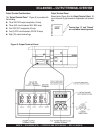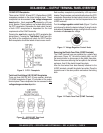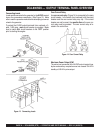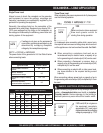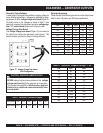
DCA-800SSK (STD) — OPERATION AND PARTS MANUAL — REV. #4 (06/03/10) — PAGE 29
DCA-800SSK — GENERATOR CONTROL PANEL
The definitions below describe the controls and functions of the
DCA-800SSK "
Control Panels
" (Figure 9).
1. Circuit Breaker OFF lamp - This indicates the main circuit
breaker is "OFF" and the generator is unable to supply
power to the load.
2. Circuit Breaker ON lamp - This indicates the main circuit
breaker is in "ON" and the generator is able to supply power
to the load.
3. Circuit Breaker Reset Switch - This button will turn off
the circuit breaker.
4. Circuit Breaker Switch - This button will turn on the main
circuit breaker.
5. Pilot Lamp – Indicates that the generator is working
properly.
6. Panel Light – Normally used in dark areas or at night time.
When activated, panel lights will illuminate. When lit this
light will make it easier to read the meters and gauges.
When the generator is not in use be sure to turn the panel
light switch to the OFF position.
7. Frequency Meter - Indicates the output frequency in hertz
(Hz). Typical reading is 60Hz.
8. AC Ammeter - Indicates the amount of current the load is
drawing from the generator.
9. AC Voltmeter - Indicates the single phase output voltage
present at the UVW terminals.
10. Voltage Regulator Control – Allows manual adjustment
of the generator’s output voltage.
11. Ammeter Change-Over Switch - This switch allows the
AC ammeter to indicate the current flow into the load
connected to any phase of the output terminals or to be
switched off.
12. Voltmeter Change-Over Switch - This switch allows the
AC voltmeter to indicate phase to phase voltage between
any two phases of the output terminals or to be switched
off.
13. Panel Light Switch - When activated will turn on control
panel light.
14. Engine Controller - This unit
(S/N 3699248~) contains a
vertical row of status LED's
(inset), that when lit, indicates
an engine malfunction (fault)
has been detected. When a
fault has been detected by
the Engine Controller as a
major fault, it will shut down
the generator.
A. Off/ Manual/ Auto Switch – This switch controls the running
of the generator. If this switch is left in the "OFF" position,
the generator will not run. When this switch is set to the
manual
position, the generator will start immediately.
If the generator is to be connected to a building's AC power
source via a transfer switch (isolation), place the switch in
the
auto
position. In this position the generator will monitor
the AC line output from the building's power source.
B. Low Oil Pressure – Indicates the engine pressure has
fallen below 15 psi. The oil pressure is detected using
variable resistive values from the oil pressure sending unit.
This is considered a
major
fault.
C. High Coolant Temperature – Indicates the engine
temperature has exceeded 215
°
F. The engine temperature
is detected using variable resistive values from the
temperature sending unit. This is considered a
major
fault.
D. Overcrank Shutdown – Indicates the unit has attempted
to be started a pre- programmed number of times, and has
failed to start. The number of cycles and duration are
programmable. Typical programmable start settings is 3
cycles with a 10 second duration .This is considered a
major
fault.
E. Overspeed Shutdown – Indicates that the engine is
running at an unsafe speed. This is considered a
major
fault.
F. Engine Running – Indicates that engine is running at a
safe operating speed.
15. Throttle Lever (Up to S/N 3699247) - This handle
controls the speed of the engine (low or high).
During
cranking cycle
, The engine controller will attempt to
crank the engine for 10 seconds before disengaging.
If the engine does not engage (start) by the third attempt, the
engine will be shutdown by the engine controller's " Over Crank
Protection" mode. If the engine engages at a speed (RPM's) that
is not safe, the controller will shutdown the engine by initializing
the "Over Speed Protection" mode.
Also the engine controller will shutdown the generator in the
event of low oil pressure, high coolant temperature, low coolant
level, and loss of magnetic pickup. These conditions can be
observed by monitoring the LED status indicators on the front of
the engine controller module.



